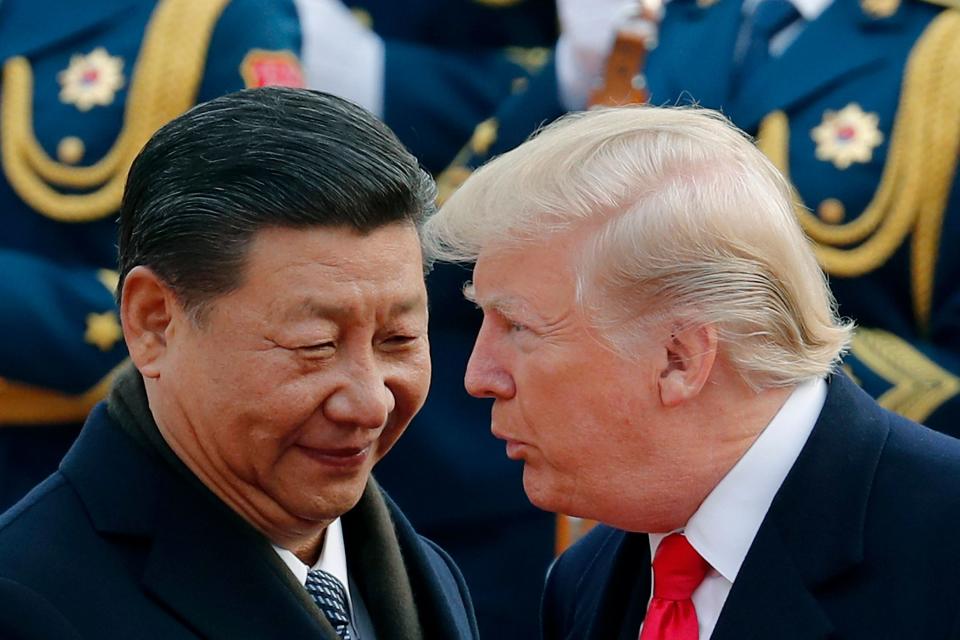China slaps tariffs on $60 billion in U.S. imports, but Donald Trump insists U.S. is well-positioned in trade fight

WASHINGTON – China said Monday it will slap tariffs on more than 5,000 U.S. products in retaliation for President Donald Trump’s decision to raise duties on Chinese goods amid trade talks between the world’s two largest economies.
China’s Ministry of Finance said the new tariffs would impact $60 billion in U.S. imports and would range from 5% to 25%. The tariffs will take effect June 1, which would give the two sides time to resume trade negotiations that broke off last week without reaching a new deal.
At the White House, Trump told reporters he was fine with China taking some retaliatory action as long as it doesn't breach an unspecified level. Trump insisted the U.S. will be taking in "tens of billions of dollars" from tariffs, although economists say the costs will be passed onto consumers in the form of higher prices.
“I love the position we’re in,” Trump said from the Oval Office. “I think it’s working out really well.”
Trump said he would meet with Chinese President Xi Jinping and Russian President Vladimir Putin at the annual G-20 gathering of global leaders in Japan this June.

China said it was levying the tariffs because of Trump's decision to raise duties on Chinese products "contrary to the consensus between China and the United States on resolving trade differences through consultations." The U.S.'s actions are "jeopardizing the interests of both sides and not meeting the general expectations of the international community," China said.
The tariffs will impact a wide range of U.S. products, including coffee, beef, salmon, flowers and some fruits and vegetables.
More: Trump will meet with China's Xi Jinping and Russia's Vladimir Putin during G-20
Stocks tumbled following China's announcement.
The Dow Jones industrial average dropped more than 600 points, or 2.3%, and closed at 25,324, its biggest one-day loss since January. Standard & Poor's 500 index slipped 2.4%, while the tech-heavy Nasdaq, which has been the most vulnerable to trade tensions, was down 3.4% at the closing bell.
Boeing's stock plummeted more than 4% after the editor of a state-owned newspaper speculated China may single out the jet manufacturer for retaliation for Trump's tariffs.
"China may stop purchasing US agricultural products and energy, reduce Boeing orders and restrict US service trade with China," Hu Xijin, editor-in-chief of the Global Times, wrote on Twitter. "Many Chinese scholars are discussing the possibility of dumping US Treasuries and how to do it specifically."
More: How the trade war with China could hit you: Higher prices, lost jobs and falling stocks
On Capitol Hill, one of the leading Republican critics of Trump's tariffs said both the U.S. and China would suffer from the tit-for-tat actions coming out of Washington and Beijing.
"Raising tariffs will hurt both US & China economies + more importantly will hurt US farmers/consumers/businesses," wrote Sen. Chuck Grassley, R-Iowa.
Cailin Birch, global economist at The Economist Intelligence Unit, said she still expects the U.S. and China to reach a limited trade agreement in the next month or so because of the serious economic ramifications both countries will be dealing with otherwise.
“However, a cooling-off period may be necessary to allow each party to save face, before meaningful progress can be made,” she said. “And without a doubt, the risk that a deal will fail to materialize has risen considerably, now that trust has been eroded on both sides.”
China's retaliatory tariffs are an extension of its previous strategy, said Douglas Holtz-Eakin, an economist and president of the American Action Forum, a nonprofit policy group.
"At every point they have matched, but not exceeded, a U.S. tariff move," Holtz-Eakin said. "This represents additional tariffs on items already facing duties — just as are the tariffs that President Trump announced last week. Stepping back, they are evidence of an escalating and increasingly troubling trade war.”
The Chinese announced the tariffs shortly after Trump warned them not to take any action and urged President Xi to sign a new trade deal.
"I say openly to President Xi & all of my many friends in China that China will be hurt very badly if you don’t make a deal because companies will be forced to leave China for other countries," Trump tweeted early Monday.
"Too expensive to buy in China,” he added. “You had a great deal, almost completed, & you backed out!"
Trade talks between the two countries stalled Friday without a new deal after Trump raised tariffs on $200 billion in Chinese goods to 25% from 10%, including office furniture, handbags and frozen catfish fillets, after trade talks between the two countries stalled.
The U.S. Trade Representative’s Office also has started the process of levying tariffs on another $325 billion in Chinese goods, a move that would mean that virtually every Chinese import that enters the U.S. will be subject to a levy.
Contributing: Janna Herron
More: Trump says tariffs only hurt China, but top adviser Kudlow admits 'both sides will suffer'
This article originally appeared on USA TODAY: China slaps tariffs on $60 billion in U.S. imports, but Donald Trump insists U.S. is well-positioned in trade fight